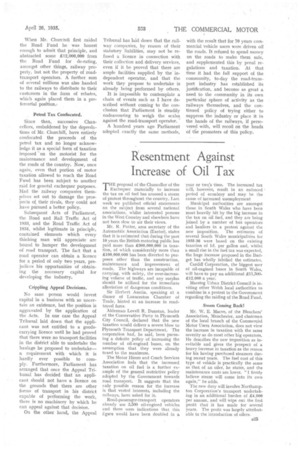Resentment Against Increase of Oil Tax
Page 43

If you've noticed an error in this article please click here to report it so we can fix it.
T"proposal of the Chancellor of the Exchequer materially to increase the tax on oil fuel has aroused a storm of protest throughout the country. Last week we published official statements on the subject from several national associations, whilst interested persons in the West Country and elsewhere have not been slow to air their views.
Mr. R. Potter, area secretary of the Automobile Association (Exeter), states that it is estimated that during the past 10 years the British motoring public has paid more than £300,000,000 in taxation, of which considerably more than £100,000,000 has been diverted to purposes other than the construction, maintenance and improvement of roads. The highways are incapable of carrying, with safety, the ever-increasing volume of traffic, and any surplus should be utilized for the immediate alleviation of dangerous conditions.
Sir Herbert Austin, speaking at a dinner of Launceston Chamber of Trade, hinted at an increase in roadtravel fares.
Alderman Lovell R. Dunstan, leader of the Conservative Party in Plymouth City Council, declared that the new taxation would deliver a severe blow to Plymouth Transport Department. The corporation had, he said, been pursuing a definite policy of increasing the number of oil-engined buses, on the assumption that they were already taxed to the maximum.
The Motor Hirers and Coach Services Association feels that the increased taxation OR oil fuel is a further example of the general restrictive policy adopted by the Government towards road transport. It suggests that the only possible reason for the increase is that vested interests, including the railways, have asked for it.
Road-passenger-transport operators already use 3,500 oil-engined vehicles and there were indications that this figure would have been doubled in a
year or two's time. The increased tax will, however, result in an enforced period of econbmy and may be the cause of increased unemployment
Municipal authorities are amongst those in South Wales who have been most heavily hit by the big increase in the tax on oil fuel, and they are being joined by a number of bus operators and hauliers in a protest against the new imposition. The estimates of several South Wales municipalities for 1935-36 were based on the existing taxation of id. per gallon and, whilst a small rise in the fuel tax was expected, the huge increase proposed in the Budget has wholly falsified the estimates.
Cardiff Corporation, the biggest user of oil-engined buses in South Wales, will have to pay an additional £11,00£12000 a year.
Maesteg Urban District Council is inviting other Welsh local authorities to combine in a protest to the Government regarding the raiding of the Road Fund.
Steam Corning Backl Mr. W. E. Macve, of the Bleachers' Association, Manchester, and chairman of the local branch of the Commercial Motor Users Association, does not view the increase in taxation with the same severity as do most other big operators. He describes the new imposition as inevitable and gives the prospect of a heavy increase in taxation as the reason for his having purchased steamers during recent years. The fuel cost of this type of vehicle is practically the same as that of an oiler, he states, and the maintenance costs are lower. "I firmly believe steam will come into its own again," he adds.
The new duty will involve Northampton Corporation's transport undertaking in an additional burden of £4,000 per annum, and will wipe out the first profit that it has made for several years. The profit was largely attributable to the introduction of oilers.




































































































